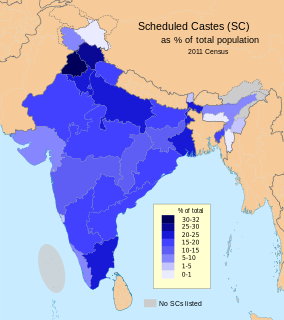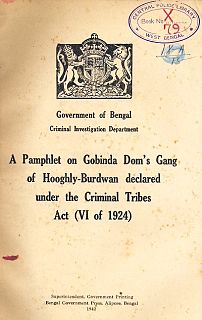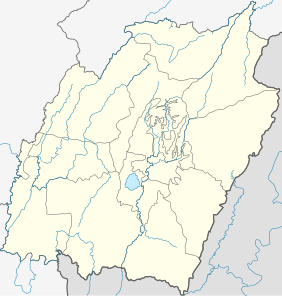
The Scheduled Caste (SCs) and Scheduled Tribes (STs) are officially designated groups of people in India. The terms are recognised in the Constitution of India and the groups are designated in one or other of the categories. For much of the period of British rule in the Indian subcontinent, they were known as the Depressed Classes.
A Nagar Panchayat or Notified Area Council (NAC) in India is a settlement in transition from rural to urban and therefore a form of an urban political unit comparable to a municipality. An urban centre with more than 11,000 and less than 25,000 inhabitants is classified as a Nagar Panchayat.
The Scheduled Castes and Tribes Act, 1989 is an Act of the Parliament of India enacted to prohibit discrimination, prevent atrocities and hate crimes against scheduled castes and scheduled tribes. The Act is popularly known as the SC/ST Act, POA, the Prevention of Atrocities Act, or simply the Atrocities Act.
The Kudumbi, also referred to as the Kunubis, the Kurumbi, or the Kunbi, are traditionally a Konkani-speaking farming community residing in Kerala, India. The majority of the group are farmers, laborers, and petty workers, settled across central and southern Kerala. Kudumbis are part of the larger Kunbi–Kurmi diaspora, a generic farming community spread out over India, with the probable exception of only Jammu and Kashmir.
Municipal or local governance refers to the third tier of governance in India, at the level of the municipality or urban local body.

Various pieces of legislation in India during British rule since the 1870s were collectively called the Criminal Tribes Act (CTA). They criminalized entire communities by designating them as habitual criminals. Under these acts, ethnic or social communities in India which were defined as "addicted to the systematic commission of non-bailable offences" such as thefts, were systematically registered by the government. Since they were described as "habitually criminal", restrictions on their movements were also imposed. Adult male members of such groups were forced to report weekly to the local police.
Amending the Constitution of India is the process of making changes to the nation's fundamental law or supreme law. The procedure of amendment in the constitution is laid down in Part XX of the Constitution of India. This procedure ensures the sanctity of the Constitution of India and keeps a check on arbitrary power of the Parliament of India.

Tribals in Kerala are the tribal population found in the Indian state of Kerala. Most of the tribals of Kerala live in the forests and mountains of Western Ghats, bordering Karnataka and Tamil Nadu.
The Customs, Excise and Service Tax Appellate Tribunal (CESTAT) is an Indian quasi-judicial body that hears appeals against orders and decisions passed under the Customs Act, 1962 and Central Excise Act, 1944 as amended from time to time. It was constituted as Customs, Excise and Gold (Control) Appellate Tribunal (CEGAT) under section 129 of Customs Act, 1962, as amended by section 50 and the Fifth Schedule of Finance Act, 1980. These amendments became effective from 11 October 1982 and the Tribunal was also constituted on the same date. Its initial mandate was under Customs Act, 1962, Central Excise Act, 1944 and Gold (Control) Act, 1968. Service tax was introduced by Chapter V of Finance Act, 1994 and this also was added to the jurisdiction of CEGAT. Accordingly, the name of the Tribunal was changed to Customs, Excise and Service Tax Appellate Tribunal (CESTAT) by amending section 129 of the Customs Act, by section 119 of Finance Act, 2003, effective from 14 May 2003.

The Eighth Amendment of the Constitution of India, officially known as The Constitution Act, 1959, amended article 334 of the Constitution in order to extend the period of reservation of seats for the Scheduled Castes and Scheduled Tribes and representation of the Anglo-Indians in the Lok Sabha and the State Legislative Assemblies for ten years, i.e. up to 26 January 1970. Article 334 had stipulated that the reservation of seats should expire within a period of ten years from the commencement of the Constitution.

The Twenty-third Amendment of the Constitution of India, officially known as The Constitution Act, 1969, discontinued reservation of seats for the Scheduled Tribes in Nagaland, both in the Lok Sabha and the State Legislative Assembly and stipulated that not more than one Anglo-Indian could be nominated by the Governor to any State Legislative Assembly. Prior to the amendment, the number of Anglo-Indians who could be nominated to the State Legislative Assemblies, was left to the discretion of the Governor of the State. The amendment also extended the period of reservation of seats for the Scheduled Castes and Scheduled Tribes and representation of the Anglo-Indians in the Lok Sabha and the State Legislative Assemblies for another ten years, i.e. up to 26 January 1980.

The Forty-fifth Amendment of the Constitution of India, officially known as The Constitution Act, 1980, extended the period of reservation of seats for the Scheduled Castes and Scheduled Tribes and representation of the Anglo-Indians in the Lok Sabha and the State Legislative Assemblies for another ten years, i.e. up to 26 January 1990.

The Ninety-fifth Amendment of the Constitution of India, officially known as The Constitution Act, 2009, extended the period of reservation of seats for the Scheduled Castes and Scheduled Tribes and representation of the Anglo-Indians in the Lok Sabha and the State Legislative Assemblies for another ten years, i.e. up to 26 January 2020.

The Sixty-second Amendment of the Constitution of India, officially known as The Constitution Act, 1989, extended the period of reservation of seats for the Scheduled Castes and Scheduled Tribes and representation of the Anglo-Indians in the Lok Sabha and the State Legislative Assemblies for another ten years, i.e. up to 26 January 2000.

The Seventy-ninth Amendment of the Constitution of India, officially known as The Constitution Act, 1999, extended the period of reservation of seats for the Scheduled Castes and Scheduled Tribes and representation of the Anglo-Indians in the Lok Sabha and the State Legislative Assemblies for another ten years, i.e. up to 26 January 2010.

Kamjong District is a district in Manipur state, India created by splitting Ukhrul district.

The One Hundred and Fourth Amendment of the Constitution of India, extends the deadline for the cessation for the reservation of seats for members from Scheduled Castes and Scheduled Tribes in the Lok Sabha and State Legislative Assemblies by a period of 10 years.




